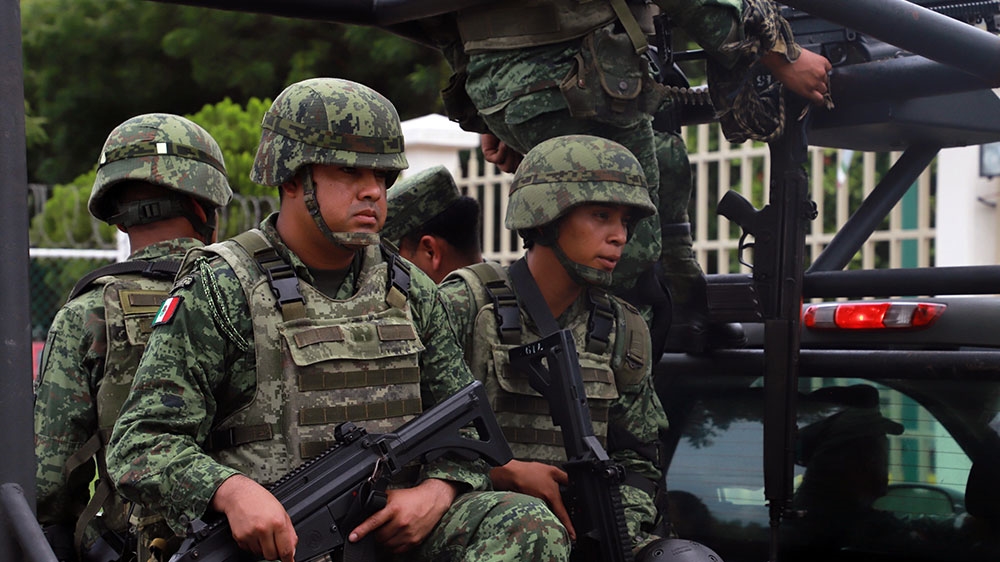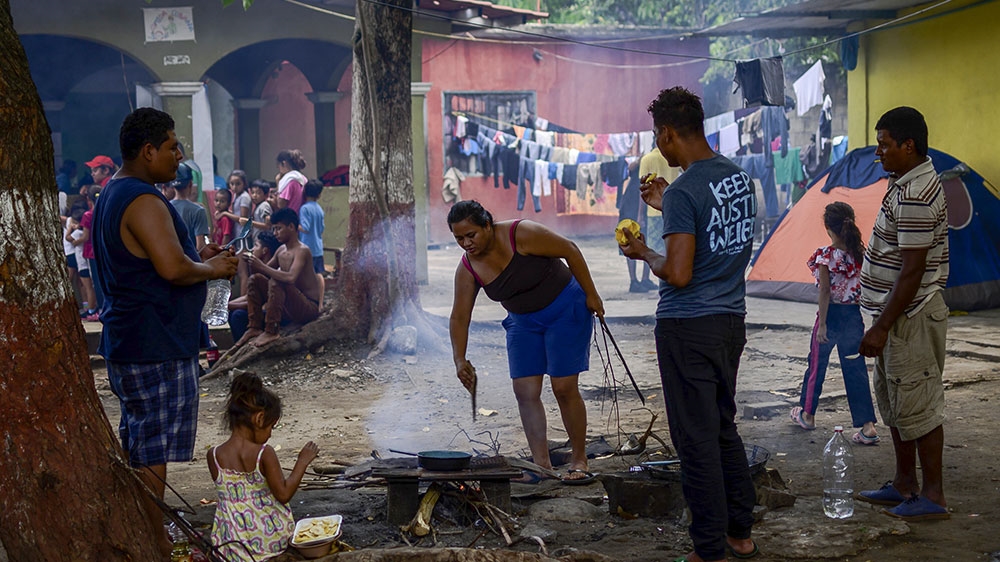‘We can’t become the wall’: Rights groups decry US-Mexico deal
Rights activists, migrants fear what the recent Mexico-US migration deal means for thousands fleeing poverty, violence.

Tapachula, Mexico – Elmer Wilmer Pineda was right across the river from Mexico this weekend when he heard the border was going to be militarised. Honduran migrants and asylum seekers at a shelter on the Guatemalan side of the border were passing around an article shared on Facebook.
“People were worried,” he told Al Jazeera. “Many people left during the night and early the next morning.”
Keep reading
list of 4 items‘Any time, any place’: Biden and Trump agree to June and September debates
Biden slaps new tariffs on Chinese imports, ratcheting trade war
Key takeaways as Cohen faces more questioning on day 17 of Trump’s trial
Pineda, 45, earned seven dollars a day working at a plantain chip factory in San Nicolas, in Santa Barbara department in western Honduras. But gangs demanded workers pay them eight dollars a week, threatening to beat or kill them if they did not comply. Several workers were beaten and local police did nothing, Pineda said.
Ten days ago, Pineda fled with his partner and 10-year-old stepdaughter. After hearing news of border militarisation, they took a raft across the Suchiate River and made their way up to Tapachula, Mexico.
The family is waiting to get in to see the Mexican Refugee Assistance Commission, COMAR, which issued them a number Monday night after a day’s wait. Along with dozens of other asylum seekers, the family has been staying day and night on a pavement near the COMAR office.

“We hope it is our turn tomorrow morning,” Pineda said.
As the Central American exodus continues, the Mexican government is cooperating with the United States and cracking down on north-bound migration. New measures have heightened uncertainty and fear among migrants and asylum seekers and drawn condemnation from rights groups.
US-Mexico deal
The Mexican and US governments publicly announced an immigration deal on Friday following US president Donald Trump‘s threats to impose escalating tariffs on Mexican exports to the US.
The “Remain in Mexico” programme, officially dubbed the Migrant Protection Protocols, will immediately expand to cover the entire US-Mexican border. Currently only in effect at ports of entry in Tijuana, Mexicali and Ciudad Juarez, the programme forces many Central Americans seeking asylum in the US to remain in Mexico while they await asylum proceeding hearings in the US.
More than 10,000 Central Americans have been returned to Mexico under the protocols since their implementation began in late January. Mexican officials expect the total number to reach 60,000 by the end of August, the head of Mexico’s refugee assistance commission said Monday.
Mexico will deploy 6,000 members of its National Guard to southern regions along and near the border with Guatemala. The deal also mentions development aid for southern Mexico and Central America, but the specifics are not yet clear.

Key elements of the deal were nothing new. The National Guard deployment was set in secret talks months ago with former Secretary of Homeland Security Kirstjen Nielsen, the New York Times reported. Plans for the expansion of the Migrant Protection Protocols had been in the cards since the programme’s inception.
Despite speculation, a “safe third country” agreement was not included in the deal.
Under such an agreement, only Mexicans would be permitted to seek asylum in the US. Guatemalans would be forced to do so in Mexico, and Hondurans and Salvadorans could potentially be restricted to seeking asylum in Guatemala. None of those
countries are safe and such agreements are not in line with international law, critics have noted.
For months, and even as recently as last week, Mexican Secretary of Foreign Affairs Marcelo Ebrard declared Mexico categorically rejected a “safe third country” agreement.
This week he said if Mexico does not reduce migration within 45 days, the government will discuss further measures, including a “safe third country” agreement, with the US.
‘We can’t become the wall’
The measures, and particularly the increased militarisation planned for the southern border, have sparked condemnation from a range of human rights, academic, and religious groups in Mexico.
“The deployment of 6,000 members of the National Guard to the southern border is not a solution that addresses the true causes of the migration phenomenon,” the Catholic bishops’ conference of Mexico wrote in a statement on Monday.
“If we as Mexicans have rejected the construction of a wall, we cannot ourselves become that wall,” they wrote.
In recent decades, Mexico has cooperated with the US to deter migrants and asylum seekers from Central America and beyond. To avoid detention and abuses by security forces, migrants are forced to travel unsafe routes by rail or through territories controlled by criminal and paramilitary groups.

Thousands of migrants have been killed or disappeared in Mexico in recent decades, according to rights groups.
Migrants and asylum seekers predominantly from Honduras and El Salvador began forming large “caravans” in October to travel openly in public groups, in large part for safety. They faced many challenges, but initial caravans were able to transit through Mexico largely unhindered by security forces.
Early this year, the new administration of president Andres Manuel Lopez Obrador began issuing humanitarian visas to migrants and asylum seekers upon entry to Mexico, permitting northbound transit. After processing more than 12,000 permits over the course of a month, the programme was abruptly terminated.
Even before the agreement with the US, Mexico had once again stepped up military and police participation in migrant detention operations in the southern border state of Chiapas.
The announced National Guard deployment generated some confusion. Passed by the Congress in February, the controversial new force was not set to officially launch until June 30.
More than half of the initial 53,000 National Guard troops were drawn from the military police, and the remainder belong to other branches of the military and the federal police force.
The timeline for the deployment of 6,000 troops is unclear. Three bases will be built in Chiapas to accommodate the National Guard, according to the state government.
‘We cannot return to Honduras’
Victor Cruz had no idea Mexico and the US were in negotiations that could affect his family. He was on the road, having fled Olanchito, a city in northern Honduras, three weeks ago with his wife, their two-year-old daughter and four-month-old son, and other relatives.
“We cannot return to our country with what we have been experiencing,” Cruz, 31, told Al Jazeera, splashing water on his daughter to cool her down.
Violence, gang threats against the family, and poverty drove the family to flee Honduras. There are no jobs in Olanchito, said Cruz. He would sometimes get a day’s work in construction here and there, but food costs are high, criminal groups extort workers, and there was never enough to feed his family.
“We were forced to leave the country,” he said.

Cruz did not hear about the announced National Guard deployment until Monday in Ciudad Hidalgo, just across the border into Mexico. Two police officers stopped the family and demanded their last remaining funds, approximately $50, as a bribe, but they otherwise made it to Tapachula unscathed.
News of border militarisation and shifting policies would not have altered the family’s plans anyway, said Cruz.
Whether it is in Mexico or in the US, they just want safety and dignity.
“We all have the same hope: to find somewhere safe to work and build a better future for our children,” he said.